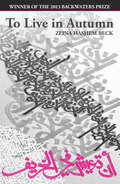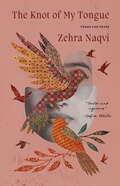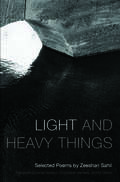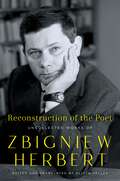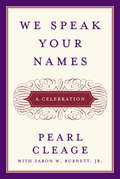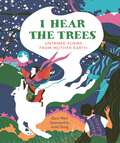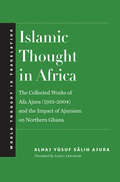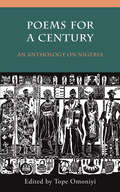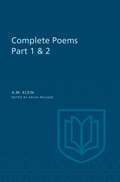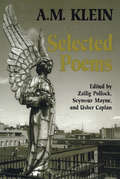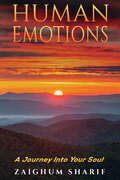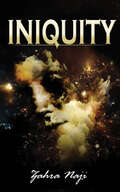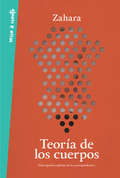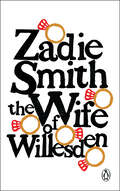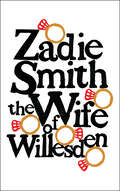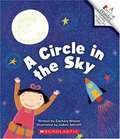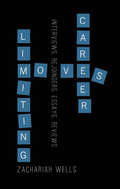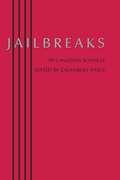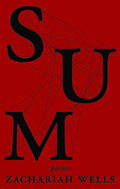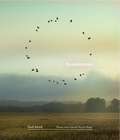- Table View
- List View
To Live in Autumn (The Backwaters Prize in Poetry)
by Zeina Hashem Beck"Zeina Hashem Beck crafts a multifaceted portrait of the people and the streets of Beirut. Part love-letter, part elegy, Hashem Beck's debut collection keeps the city from becoming 'a shadow of a memory, / the memory of a shadow' for poet and reader both, offering us instead 'labyrinths / in which we get lost on purpose.' This collection is as vibrant and sensitive as its subject—the city that 'understands / not being tired of being.' Join me in an enthusiastic welcome for a compelling new voice in Anglophone poetry."—John Hennessy
The Knot of My Tongue: Poems and Prose
by Zehra NaqviFor readers of Fatimah Asghar&’s If They Come for Us, here is a searing, multidimensional debut about the search for language and self, which is life itself.I knew it was time to build what could carry, what could find the high point to name what I knew to be the world and carry it with meAt the heart of The Knot of My Tongue is Zehra Naqvi&’s storying of language itself and the self-re-visioning that follows devastating personal rupture. Employing a variety of poetic forms, these intimate, searching poems address generations, continents, and dominions to examine loss of expression in the aftermath of collisions with powerful forces, ranging from histories to intimacies. Naqvi follows a cast of characters from personal memory, family history, and Quranic traditions, at instances where they have either been rendered silent or found ways to attempt the inexpressible—a father struggling to speak as an immigrant in Canada; a grandmother as she loses her children and her home after the 1947 Partition; the Islamic story of Hajar, abandoned in the desert without water; the myth of Philomela who finds language even after her husband cuts off her tongue. Brilliantly blending the personal and the communal, memory and myth, theology and tradition, the poems in this collection train our attention—slow and immediate, public and private—on our primal ability to communicate, recover, and survive. This example is striking for the power of its speaking through loss and a singular, radiant vision.
Light and Heavy Things
by Christopher Kennedy Faisal Siddiqui Zeeshan Sahil Mi DitmarLight and Heavy Things provides readers in this country an opportunity to discover the work of the late Pakistani poet, Zeeshan Sahil. Although readers of Urdu poetry mourned his passing in 2008, Sahil is a relatively unknown poet in the United States. Sahil's work conveys his post-modern sensibility with plain language, presenting political realities of Pakistan in personal terms.
Light and Heavy Things: Selected Poems of Zeeshan Sahil (Lannan Translations Selection Series)
by Zeeshan SahilLight and Heavy Things provides readers in this country an opportunity to discover the work of the late Pakistani poet, Zeeshan Sahil. Although readers of Urdu poetry mourned his passing in 2008, Sahil is a relatively unknown poet in the United States. Sahil's work conveys his post-modern sensibility with plain language, presenting political realities of Pakistan in personal terms.
Reconstruction of the Poet: Uncollected Works of Zbigniew Herbert
by Zbigniew HerbertFrom one of Poland's most acclaimed poets comes a new collection of poems and plays spanning almost five decades and translated for the first time.Encapsulating the prolific work of the poet and playwright Zbigniew Herbert, Reconstruction of the Poet is both a celebration of a profound life of letters and a wide-ranging collection of never-before-published work that casts new light on a much-loved poet. Spanning from 1950 to 1998, this volume of work contains three plays—The Philosophers’ Cave, The Other Room, and Reconstruction of the Poet—and over fifty poems. This collection takes readers through the mind of a man attempting to look at the ruins of a postwar world while seeking living sources of European culture, with poems commemorating contemporaries fallen in wartime, elevating erotic experience and friendship, and exploring political and metaphysical passions.A rich expansion of previously published works by Herbert, Reconstruction of the Poet is both an introduction for readers who might still be unfamiliar with this important poet’s work and a fresh invitation for reflection for his longtime readers.
We Speak Your Names: A Celebration
by Pearl Cleage Zaron W. Burnett Jr.For centuries, African American women have been remaking the world, giving testament to the power of hope, courage, and resilience. But it took the inspired generosity of Oprah Winfrey to honor fully the many gifts of sisterhood. For three amazing days-from May 13 to 15, 2005--a distinguished group of women was invited to celebrate the enduring achievements of twenty-five of their mentors and role models--and in the process pay tribute to the long, glorious tradition of African American accomplishment. The brilliant centerpiece of the weekend was the reading aloud of Pearl Cleage's poem "We Speak Your Names," written especially for the occasion and appearing here for the first time in this beautiful keepsake book. As deeply moving in print as it was during that weekend of love and praise, the poem names each of the women honored: Dr. Maya Angelou, Coretta Scott King, Diahann Carroll, Toni Morrison, Nikki Giovanni, Rosa Parks, Katherine Dunham, and other legends of the brightest magnitude. With heartfelt eloquence, Pearl Cleage (herself a luminary of the younger generation) celebrates her distinguished elders' strength, their magic, their sensuality, their loving kindness, their faith in themselves, and the priceless example of their lives. In her introduction, the poet shares: "My sisters, here, there, and everywhere, this poem is for you. Use it, adapt it, pass it on..." Destined to become a classic, We Speak Your Names is a treasure to keep forever and a precious, inspiring gift for the ones you love.
I Hear The Trees
by Zaro WeilJourney into the wild world of Mother Earth in this enchanting poetry collection, beautifully illustrated by Junli Song. Sigh as a mother wolf teaches her cub how to howl. Laugh with bamboozled berries and a ruby-wonderful beet. Feel the thrill of Tyranno's terrifying tale and play with ten on-the-run haiku mice.Your imagination will soar as a hullabaloo of creatures and plants, moon, sun and stars make their way word by word and picture by fantastical picture into your heart.
Imagine Africa: Volume 3
by Bhakti Shringarpure Emmanuel Dongala Abdourahmane Waberi Jean Senac Zanele MuholiThrough a collage of poems, essays, fiction, conversations, and visual art, Imagine Africa: Volume Three brings together some of the most essential writers, artists, and thinkers of contemporary Africa. Including powerful photographs in color by Zanele Muholi, stills from the films of Jean-Pierre Bekolo, and works of fiction and poetry from nine languages, Imagine Africa: Volume Three offers a glimpse into a kaleidoscopic and vibrant continent.The series is published by Island Position, the literary imprint of the Pirogue Collective - the cultural expression of Senegal's Gorée Institute, which aims to celebrate the diverse voices and imaginations of the continent of Africa and its diaspora. The collective encourages vital dialogue between writers and visual artists from across Africa with those from other parts of the world. Spanning across numerous languages, traditions, and media, Imagine Africa: Volume Three brings together some of the most essential voices and visions of Africa today.Contributors include: • Hassan Hajjaj • Reesom Haile • Chika Unigwe • Isaac O. Delano • Kerry Bystrom • Ungulani Ba Ka Khosa • Breyten Breytenbach • Hassan Ghedi Santur • Alfred Schaffer • Sanmao • Tarek Eltayeb • Diekoye Oyeyinka • Jean-Pierre Bekolo • Kenneth HarrowTranslators include: • Nicole Ball • David Ball • Charles Cantalupo • Akin Adesokan • David Brookshaw • Kai Krienke • Sara C. Hanaburgh • Michelle Hutchinson • Mike Fu • Kareem James Abu-Zeid • Bhakti Shringarpure • Abdourahmane Waberi • Zanele Muholi • Jean Senac • Emmanuel Dongala
Islamic Thought in Africa: The Collected Works of Afa Ajura (1910-2004) and the Impact of Ajuraism on Northern Ghana (World Thought in Translation)
by Alhaj Yusuf Ajura Zakyi IbrahimThe first book length-work on Afa Ajura and translation of his complete poems This is the first English translation of and commentary on the collected poems of Alhaj YŠ«suf á¹¢Ä?liḥ Ajura (1910–2004), a northern Ghanaian orthodox Islamic scholar, poet, and polemicist known as Afa Ajura, or “scholar from Ejura.” The poems, all handwritten in Arabic script, mainly in the Ghanaian language of Dagbani and also Arabic, explore the author’s socio†‘religious beliefs. In the accompanying introduction, the translator examines the diverse themes of the poems and how they challenge TijÄ?niyyah Sufi clerics and traditional practices such as idol worship.
Poems for a Century: An Anthology on Nigeria
by Ifi Amadiume Tade Akin Aina Sumaila Umaisha Toyin Adewale-Gabriel Okinba Launko Afam Akeh Femi Oyebode Amatoritsero Ede Peter Akinlabi Tanure Ojaide Zainabu Jallo Richard Ali Ismail Bala Obi Nwakanma Adebayo Lamikanra Hope Eghagha Funso Aiyejina Jekwu Ozoemene Ogaga Ifowodo Chidi Anthony Opara Sulaiman Adebowale Kole Ade-Odutola Uzor Maxim Uzoatu E. E. Sule Akeem Lasisi Olajumoke Verissimo Cyril Obi Tolu Ogunlesi Omohan Ebhodaghe Tope Omoniyi John Pepper Clark Olu Oguibe Uche Nduka Remi Raji Molara A32 Prince Abiathar Zadok Molara Wood WoodIn 2010, billions of naira were spent to celebrate the 50th anniversary of Nigeria's independence since 1960. More naira are to be spent in 2014 to commemorate the centenary marking the nation's birth in 1914 from an amalgamation of diverse group of peoples, languages, cultures and expectations. As the conscience of the nation, writers are calling for a deeper introspection. A hundred years after unification, the most populous African nation has oscillated from being great to being fickle, from colony to independence and dependency, from peace to war to ungraceful insecurity, from military dictatorship to civilian oppression and profligacy and much more of the many contradictions of a complex national polity. In this special collection Poems for a Century: An Anthology on Nigeria, poets from different backgrounds, generations and persuasions explore what it means to be a citizen of this unique African country. Shifting from despair to hope, lamentation to happiness, condemnation to adoration and every gamut of sensibilities imaginable, the contributors reiterate the notion of engagement and the power of the written word to push for social change in their beloved nation. In fifty poems, Nigeria becomes the muse not just to raise questions about its past experiences and present contexts, but also to posit aspirations for a better nation.
A.M. Klein: Original Poems 1937-1955 and Poetry Translations
by A. M. Klein Zailig PollockIt is for his poetry that A.M. Klein is best known and most warmly remembered. This collection includes all Klein's poetry, both original works and translations from Hebrew, Yiddish, Aramaic, and Latin. Many of them, coming from all periods of his careers, have never been published.The poems are arranged chronologically according to date of composition. This makes possible, for the first time, an appreciation of Klein's poetic development. The editor's introduction places this development in the perspective of Klein's life and time, and in particular explores Klein's lifelong struggle to reconcile his dual vocations as both a Jewish and a modernist writer.The textual apparatus identifies all authoritative versions for each poem and lists all emendations and all substative variants in both published and mauscript versions. The explanatory notes gloss obscure terms and references. They also provide a rich context for appreciation and interpretation by drawing connections with Klein's life, his wide reading, and his work as a whole. Wherever possible, Klein's own numerous, but scattered, comments on his poems have been cited.
Selected Poems
by Seymour Mayne A. M. Klein Zailig Pollock Usher CaplanThroughout his career A.M. Klein struggled to define for himself the role of the poet in the contemporary world. Deeply rooted in the traditions of Judaism, and at the same time powerfully attracted by the freedom and scope of international modernism, he sought to reconcile past and present, community and creative individuality. Whether or not he finally achieved his own high aims, it was, in his own words, 'something merely to entertain them.' The result was a body of work immensely rich and varied in tone, language, cultural resonance.This collection of eighty-four poems offers a representative sampling of Klein's finest poetry, while taking into account the changing critical discourse of the last fifty years. Anyone interested in experiencing the full range of Klein's poetic achievement, or in understanding the complex nature of the poet, need look no further than this eminently readable volume.
Human Emotions
by Zaighum SharifEach and everyone of us has our own human emotions. Days can be filled with happiness whereas other days can be full of sadness. The uniqueness of one’s emotions can very rarely be understood by others. It is really difficult if not impossible to tell others how you feel or for them to understand how you are feeling. I have tried in this book to cover the inner most boundaries of human emotions splitting my poems into different realms of human thought. Hope, fate and destiny, joy, life, the world, loneliness, love, regrets, religion and the future are all covered in this book. I hope the reader can relate to and understand my poems and bring some perspective and reasoning towards their life. We are all not the same and never can be but we all have a heart and soul. By identifying these moments of thought I hope I can bring perspective and understanding to the reader. I hope you enjoy my book.
Iniquity
by Zahra NajiThe poem cycle Iniquity tells a tale of unfulfilled love as seen through the eyes of a teenager, taking the reader on a heartfelt journey of hope, trust, desire and dreams which will finally be crushed by the bitter iniquity of life. Written when the author was sixteen years old, Iniquity’s haphazard jumble of emotions are embedded in every line of every poem. Taken as a whole, the book represents an authentic record of each emotional stage of a love story. Readers are sure to recognise the feelings these poems evoke, whether they experienced them in the past or continue to battle against them even now.
Teoría de los cuerpos: Descripción explícita de la correspondencia
by ZaharaTeoría de los cuerpos es un análisis poético de las maneras de relacionarnos que tenemos los seres humanos: cuerpos que se mueven, se repelen y se imantan con sus iguales por razones a veces difíciles de comprender. «Intenté entender qué nos sucedía desde todos los ángulos posibles. Observé el ansia, la espera, el deseo, la tristeza, el vacío. La carne, áspera a veces, rugosa; el pulso caliente, la búsqueda a toda costa. »Reconozco que allí no había respuestas. Encontré otras vidas dentro de un solo cuerpo y cómo su relación con los otros condicionaba su propia existencia. Así a veces se sentía sustraído, partido o en expansión con ellos. »Busqué dentro lo que siempre había sentido fuera. Tuve que abrirme con mis propias manos, dejar que otras también lo hicieran. Y solo cuando atravesé el dolor y la nostalgia, el placer y la soberbia, descubrí que lo que había ahí enterrado era real, que absolutamente todo era cierto.»Zahara _____________ A través de poemas, textos más narrativos y semaforismos, la cantante y escritora Zahara demuestra una vez más que el talento no se compartimenta. Crea, a través de este poemario dividido en tres partes («Clausuras de un cuerpo», «Correspondencias de los cuerpos» y «Extensión de un cuerpo»), su propia interpretación de la teoría matemática de los cuerpos, que estudia sus propiedades. Un libro que sorprende por su originalidad y su calidad y que, al mismo tiempo, contiene todos los ingredientes a los que ella nos tiene acostumbrados y que tanto nos gustan: su humor, un toque de surrealismo, el exceso, el amor, el dolor, el deseo e incluso la náusea, mezclados y agitados en su justa medida. De Trabajo, piso, pareja se ha dicho...«Hay debuts literarios que logran sorprender a propios y extraños. Da igual que ya conocieras la faceta musical de Zahara: no estás preparado para Trabajo, piso, pareja, un fresco íntimo sobre la vida de una relación que actúa como un diagnóstico íntimo de algunas patologías generacionales.»Revista GQ «Un certero retrato generacional de los anhelos y las decepciones de los treintañeros.».El Confidencial «Un relato a dos voces sobre la conciliación romántica y profesional en una época en la que está mal visto enamorarse, en la que el trabajo es la prioridad y el desapego familiar la norma. Todo envuelto en el papel de una sociedad en la que sostener en pie una relación es más difícil que conseguir que un castillo de naipes sobreviva a una ligera brisa.»Vogue
Teoría de los cuerpos: Descripción explícita de la correspondencia
by ZaharaTeoría de los cuerpos es un análisis poético de las maneras de relacionarnos que tenemos los seres humanos: cuerpos que se mueven, se repelen y se imantan con sus iguales por razones a veces difíciles de comprender. «Intenté entender qué nos sucedía desde todos los ángulos posibles. Observé el ansia, la espera, el deseo, la tristeza, el vacío. La carne, áspera a veces, rugosa; el pulso caliente, la búsqueda a toda costa. »Reconozco que allí no había respuestas. Encontré otras vidas dentro de un solo cuerpo y vi cómo su relación con los otros condicionaba su propia existencia. Así a veces se sentía sustraído, partido o en expansión con ellos. »Busqué dentro lo que siempre había sentido fuera. Tuve que abrirme con mis propias manos, dejar que otras también lo hicieran. Y solo cuando atravesé el dolor y la nostalgia, el placer y la soberbia, descubrí que lo que había ahí enterrado era real, que absolutamentetodo era cierto.»Zahara _____________ A través de poemas, textos más narrativos y semaforismos, la cantante y escritora Zahara demuestra una vez más que el talento no se compartimenta. Crea, a través de este poemario dividido en tres partes («Clausuras de un cuerpo», «Correspondencias de los cuerpos» y «Extensión de un cuerpo»), su propia interpretación de la teoría matemática de los cuerpos, que estudia sus propiedades. Un libro que sorprende por su originalidad y su calidad y que, al mismo tiempo, contiene todos los ingredientes a los que ella nos tiene acostumbrados y que tanto nos gustan: su humor, un toque de surrealismo, el exceso, el amor, el dolor, el deseo e incluso la náusea, mezclados y agitados en su justa medida. De Trabajo, piso, pareja se ha dicho...«Hay debuts literarios que logran sorprender a propios y extraños. Da igual que ya conocieras la faceta musical de Zahara: no estás preparado para Trabajo, piso, pareja, un fresco íntimo sobre la vida de una relación que actúa como un diagnóstico íntimo de algunas patologías generacionales.»Revista GQ «Un certero retrato generacional de los anhelos y las decepciones de los treintañeros.».El Confidencial «Un relato a dos voces sobre la conciliación romántica y profesional en una época en la que está mal visto enamorarse, en la que el trabajo es la prioridad y el desapego familiar la norma. Todo envuelto en el papel de una sociedad en la que sostener en pie una relación es más difícil que conseguir que un castillo de naipes sobreviva a una ligera brisa.»Vogue
The Wife of Willesden
by Zadie SmithZadie Smith's first time writing for the stage, a riotous twenty-first century translation of Geoffrey Chaucer's classic The Wife of Bath&“Married five times. Mother. Lover. Aunt. Friend. She plays many roles round here. And never Scared to tell the whole of her truth, whether Or not anyone wants to hear it. Wife Of Willesden: pissed enough to tell her life Story to whoever has ears and eyes . . .&” In her stage-writing debut, celebrated novelist and essayist Zadie Smith brings to life a comedic and cutting twenty-first century translation of Geoffrey Chaucer&’s classic The Wife of Bath. The Wife of Willesden follows Alvita, a Jamaican-born British woman in her mid-50s, as she tells her life story to a band of strangers in a small pub on the Kilburn High Road. Wearing fake gold chains, dressed in knock-off designer clothes, and speaking in a mixture of London slang and patois, Alvita recalls her five marriages in outrageous, bawdy detail, rewrites her mistakes as triumphs, and shares her beliefs on femininity, sexuality, and misogyny with anyone willing to listen. A thoughtful reimagining of an unforgettable narrative of female sexual power, written with singular verve and wit, The Wife of Willesden shows why Zadie Smith is one of the sharpest and most versatile writers working today.
The Wife of Willesden
by Zadie SmithZadie Smith's first time writing for the stage, a riotous twenty-first century translation of Geoffrey Chaucer's classic "The Wife of Bath"&“Married five times. Mother. Lover. Aunt. Friend. She plays many roles round here. And never Scared to tell the whole of her truth, whether Or not anyone wants to hear it. Wife Of Willesden: pissed enough to tell her life Story to whoever has ears and eyes...&” In her stage-writing debut, celebrated novelist and essayist Zadie Smith brings to life a comedic and cutting twenty-first century translation of Geoffrey Chaucer&’s classic The Wife of Bath. The Wife of Willesden follows Alvita, a Jamaican-born British woman in her mid-50s, as she tells her life story to a band of strangers in a small pub on the Kilburn High Road. Wearing fake gold chains, dressed in knock-off designer clothes, and speaking in a mixture of London slang and patois, Alvita recalls her five marriages in outrageous, bawdy detail, rewrites her mistakes as triumphs, and shares her beliefs on femininity, sexuality, and misogyny with anyone willing to listen. A thoughtful reimagining of an unforgettable narrative of female sexual power, written with singular verve and wit, The Wife of Willesden exemplifies why Zadie Smith is one of the sharpest and most versatile writers working today.
A Circle in the Sky
by Zachary WilsonA child puts together various simple shapes to build a rocket that will fly to the moon.
あなたが書いた詩の支払いを受ける
by Bernard Levine Zachary Watts本は、あなたが詩を書くことが大好きなら、あなたは300以上のサイトを介して詩を書くために支払わ得ることができるので、なぜあなたが行うために楽しむ何かのために支払われないことを示しています?その価値があるので!
Career-Limiting Moves
by Zachariah WellsBy turns celebratory and sceptical, Career Limiting Moves is a selection of essays and reviews drawn from a decade of immersion in Canadian poetry. Inhabiting a milieu in which unfriendly remarks are typically spoken sotto voce-if at all-Wells has consistently said what he thinks aloud. The pieces in this collection comprise revisionist assessments of some big names in Canadian Poetry (Margaret Atwood, Lorna Crozier, Don McKay and Patrick Lane, among others); satirical ripostes parrying others' critical views (Andre Alexis, Erin Moure, Jan Zwicky); substantial appraisals of underrated or near-forgotten poets (Charles Bruce, Kenneth Leslie, Peter Sanger, John Smith, Peter Trower, Peter Van Toorn); assessments of promising debuts (Suzanne Buffam, Pino Coluccio, Thomas Heise, Peter Norman) and much else besides-including a few surprises for anyone who thinks they have Wells's taste figured out.Zachariah Wells is the editor of Jailbreaks: 99 Canadian Sonnets and the author of two collections of poetry.
Jailbreaks
by Zachariah WellsIn 1910 Lawrence J. Burpee published an anthology of 100 Canadian Sonnets. Poet and critic Zachariah Wells figured it was high time for an update on that dusty tome. In Jailbreaks, Wells has gathered 99 of his favourite sonnets written by Canadians, from the 19th century to the present day.
Sum
by Zachariah WellsNimbly slipping between personae, masks, and moods, the prosody-driven poems of Sum weigh the volatility and mutability of the self against the forces of habit, instinct, and urge. <P><P>With homages to Hopkins, Graves, Wislawa Szymborska, Paul Muldoon, and more, and in allusion-dappled, playfully sprung stanzas, this third book from poet and critic Zachariah Wells both wears its influences openly and spins a sound texture all its own, in a collection far greater than its parts.Zachariah Wells is the author of two collections of poetry and a book of criticism (Career Limiting Moves, 2014).
Track & Trace
by Seth Zachariah WellsThe poems in Zachariah Wells's second collection range from childhood to dimly foreseen events in the future; they idle on all three of Canada's coasts, travel the open road, take walks in the city and pause on the banks of country streams and ponds.
Annulments
by Zach SavichWinner of the 2010 Colorado Prize for Poetry. "It is the poet who, undistracted by the imbecile telegraphy of this moment, dares to sustain a sustaining sound I most esteem and most warmly embrace. Zach Savich has written a book both intimate and vast, both tender and acidly candid. And with his long poem, 'The Mountains Overhead,' he has entered that visionary company of poets who, by overturning Babel, lay the heavens at our feet." --Donald Revell "Sparse, spare, these lines nonetheless overflow with a sheer and brilliant imagination- 'The crows: hearing our voices through wires'; 'the horses hold themselves like torches'; 'the sun a dial tone . . .' The tension between minimalism of form and maximalism of concept and feeling gives this work a vivid, oddly crystalline, momentum. The central long poem unfolds one small leaf at a time, yet resists accumulation; instead it presents us again and again with the opportunity to immerse ourselves in the slightly uncanny: what would it be to sing instead of to say? This book gives us an intimation." --Cole Swensen
